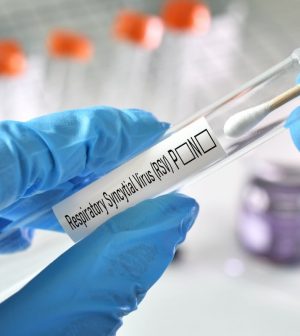- Could Your Grocery Store Meat Be Causing Recurring UTIs?
- Are You Making This Expensive Thermostat Error This Winter?
- Recognizing the Signs of Hypothyroidism
- 10 Strategies to Overcome Insomnia
- Could Artificial Sweeteners Be Aging the Brain Faster?
- Techniques for Soothing Your Nervous System
- Does the Water in Your House Smell Funny? Here’s Why
- Can a Daily Dose of Apple Cider Vinegar Actually Aid Weight Loss?
- 6 Health Beverages That Can Actually Spike Your Blood Sugar
- Treatment Options for Social Anxiety Disorder
Poll Finds Public Fears Over RSV Have Eased, Although It Remains a Threat

Public concerns about contracting RSV (respiratory syncytial virus) have significantly declined during the past year, a new survey shows.
About 1 in 4 people (26%) are now worried that they or a family member will get RSV during the next three months, the Annenberg Public Policy Center survey shows.
That’s less than the 1 in 3 who were worried about this time last year, at the onset of the RSV season, researchers said.
By contrast, about the same proportion of people are worried about contracting either COVID-19 or the flu, 33% and 37% respectively, results show.
“It is possible that memories of last year’s winter holiday surge in respiratory illnesses and of the 2022-23 ‘tripledemic’ of COVID-19, flu and RSV respiratory viruses have faded,” said survey head Kathleen Hall Jamieson, director of the Annenberg Public Policy Center of the University of Pennsylvania.
RSV vaccines for older adults first became available in May 2023. In June 2024, the U.S. Centers for Disease Control and Prevention updated its recommendations, urging everyone 75 and older as well as at-risk seniors 60 to 74 to get a single dose of the RSV vaccine.
The CDC also has recommended the RSV vaccine for pregnant women in the last trimester, to protect babies born during RSV season. A monoclonal antibody shot that protects against RSV is available for infants 8 months and younger.
“We are seeing increased awareness of RSV vaccines to protect the very young,” said Laura Gibson, the senior data analyst at APPC who analyzed the RSV data. “If this translates into increased immunization rates, we could reduce their hospitalization rates.”
Nearly half of those surveyed (46%) know there is an FDA-approved vaccine against RSV available to pregnant women, a significant increase in awareness from just 12% the year before, researchers said.
The number of people unsure of whether there’s a RSV vaccine also decreased from 70% last year to 50% this season.
The new survey found that about half of respondents support RSV preventives. About 46% would recommend the RSV vaccine to a pregnant friend or family member, and 46% would recommend the monoclonal antibody shot to someone with an infant.
Given a choice of protection for newborns, 40% preferred the vaccine in pregnancy compared with 11% for the infant injection.
More than half of those surveyed (54%) supported the RSV vaccine for seniors, results show.
The survey also found that few Americans have accurate information about RSV.
For example, only 1 in 5 people (20%) know it’s more accurate to say that RSV usually produces mild, cold-like symptoms.
Likewise, only 1 in 4 people (25%) knew that RSV can survive for many hours on hard surfaces, and just 4 in 10 (42%) know a person can repeatedly contract RSV. A similar number, 43%, know people can have and spread RSV before they show symptoms.
About half of people (51%) knew folks are most likely to get RSV in the fall and winter, the poll found.
But most are unaware of how common RSV infections are, with 85% thinking they’ve never had RSV. According to the CDC, nearly all children catch a case of RSV by the time they’re 2.
The survey involved 1,755 U.S. adults polled in September 2024.
More information
The U.S. Centers for Disease Control and Prevention has more on RSV.
SOURCE: Annenberg Public Policy Center, news release, Oct. 14, 2024
Source: HealthDay
Copyright © 2026 HealthDay. All rights reserved.










